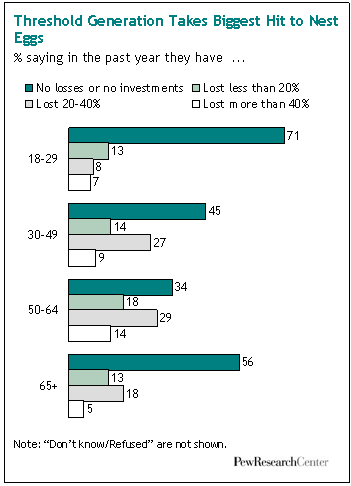Call them the Threshold Generation: Americans ages 50 to 64 who are at or near the peak of their earnings potential and net worth, and who are also at the brink of retirement, if they haven’t already stopped working. They are the generation that has the most to lose in a recession marked by a stock market meltdown. And, true to form, according to this survey, they’re the ones who have suffered the most.

Members of the Threshold Generation are the most likely to have lost money in stocks or retirement accounts — and they have also suffered the biggest losses. They are the most likely to say they won’t have enough to live on in retirement. And nearly half (46%) of 50 to 64 year olds who are not yet retired say that in the past year they’ve considered delaying their eventual retirement, a higher share than says the same within any other age group.
Two-thirds of the Threshold Generation say they have lost money in the past year in investment accounts, compared with slightly more than half of 30- to 49-year-olds and 43% of those 65 or older. Only about three-in-ten adults under the age of 30 experienced losses, in large part because proportionately fewer young people have invested in stocks, mutual funds or 401(k) programs.
Members of the Threshold Generation also are more likely to have suffered the biggest losses. Nearly one-in-seven (14%) say their investment or retirement holdings declined more than 40% in just the past year, compared with 5% of older adults, 7% of those under 30 and 9% of adults ages 30 and 49.
Most Americans, young or old, worry that the recession will make it harder to take care of their financial needs in retirement, and adults in the Threshold Generation — those at or nearing retirement age — worry about it the most. Among those ages 50 to 64, three-quarters say that the recession has made it harder for them to take care of their financial needs in retirement, compared with two-thirds of those under 50 and a modest majority of those 65 or older (56%).
Income matters surprisingly little in fueling the recession-driven financial worries of the Threshold Generation. Some 73% of those with family incomes under $30,000 as well as 78% of those with incomes of $100,000 or more say the recession will make it harder to take care of their financial needs once they retire. Similarly, there is little difference by gender or levels of education or by race, suggesting that these concerns are broadly felt by many of those nearing the end of their working lives.
Other Demographic Groups
But what about younger Americans, many of whom have just entered the workforce or are still looking for their first job? These data suggest that the recession-era experiences of adults younger than 30 have been mixed. People in this age group are the most likely to report having trouble getting or paying for medical care in the past year (27% vs. 20% for all adults). About two-thirds say they had to cut back on household spending, roughly similar to the proportion of middle-aged adults who have had to economize but larger than the share of older adults who have taken this step in the past year. But younger adults are among the most confident of any age group that they will have enough money in their retirement years.
Few other significant demographic differences emerge in the financial experiences of Americans during the recession era. Women are no more likely than men to say that they have had trouble getting or paying for medical care (21% vs. 19%). And two-thirds of both men and women predict that the nation’s current economic problems will make it harder for them to take care of their financial needs in retirement. At the same time, women are slightly more likely than men to say they have trimmed household spending in the past year (63% vs. 57%), while men are somewhat more likely to say they have lost money on investments or retirement accounts (52% vs. 47%).




